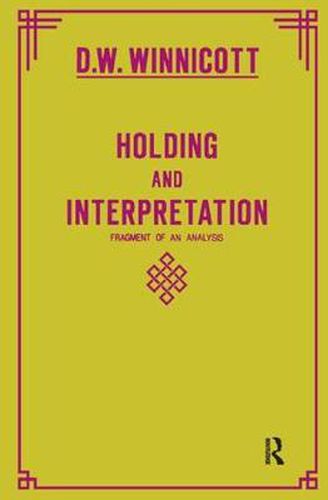Readings Newsletter
Become a Readings Member to make your shopping experience even easier.
Sign in or sign up for free!
You’re not far away from qualifying for FREE standard shipping within Australia
You’ve qualified for FREE standard shipping within Australia
The cart is loading…






In his illuminating introduction, Masud Khan, to whom Dr Winnicott’s case notes were entrusted, relates this definite text of Holding and Interpretation: Fragment of an Analysis to an earlier phase of the treatment of the same patient described by Winnicott in his paper ‘Withdrawal and Regression’, also included in this volume.The case documents the therapeutic care of a highly gifted professional man who suffered a psychotic breakdown with acute depression, and who, through analysis, and hospital treatment, was gradually helped to recovery. It is remarkable for many things: Dr Winnicott’s skill at ‘holding’ the patient in the analytical sessions, and providing guidance through sensitive interpretation; his ability to re-enforce the patient’s sexual and ego functions; his instinctive recognition of the value of silence (as a way of showing trust, and of not destroying by intent); his capacity to accept the paradox that verbal communication can be both meaningful and a negation of psychic reality; and, not least, his acute judgment of when to stop the analysis.
$9.00 standard shipping within Australia
FREE standard shipping within Australia for orders over $100.00
Express & International shipping calculated at checkout
In his illuminating introduction, Masud Khan, to whom Dr Winnicott’s case notes were entrusted, relates this definite text of Holding and Interpretation: Fragment of an Analysis to an earlier phase of the treatment of the same patient described by Winnicott in his paper ‘Withdrawal and Regression’, also included in this volume.The case documents the therapeutic care of a highly gifted professional man who suffered a psychotic breakdown with acute depression, and who, through analysis, and hospital treatment, was gradually helped to recovery. It is remarkable for many things: Dr Winnicott’s skill at ‘holding’ the patient in the analytical sessions, and providing guidance through sensitive interpretation; his ability to re-enforce the patient’s sexual and ego functions; his instinctive recognition of the value of silence (as a way of showing trust, and of not destroying by intent); his capacity to accept the paradox that verbal communication can be both meaningful and a negation of psychic reality; and, not least, his acute judgment of when to stop the analysis.